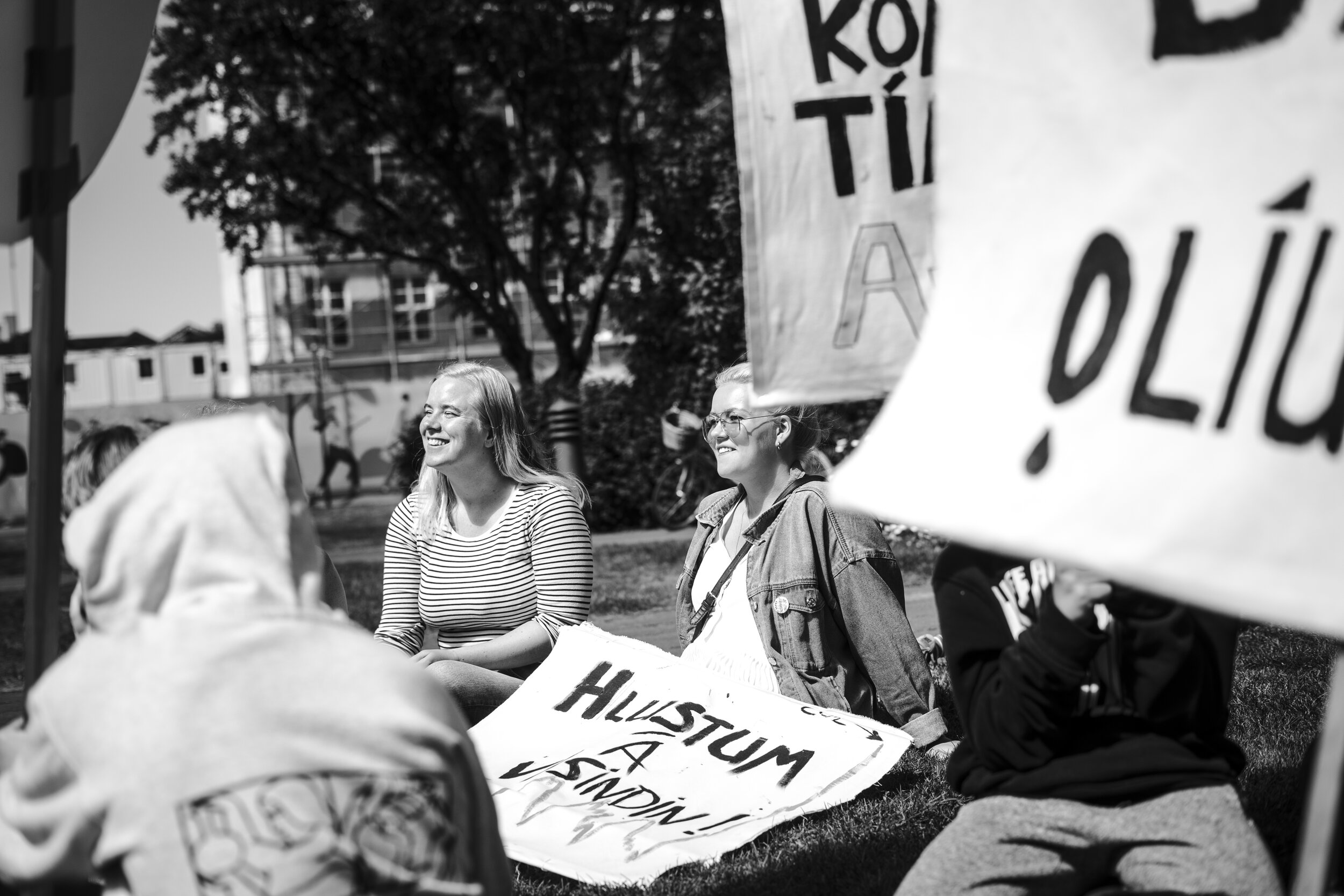“School strike for the climate”
Ljósmynd/Carlos Machin Mendez
Translation: Katrín le Roux Viðarsdóttir
Activist Greta Thunberg’s climate strikes and fighting spirit have not gone unnoticed around the world. On Friday, August 20th, 2018, Thunberg did not go to school; instead, she sat in front of the Swedish Parliament with protest signs, demanding that the government pay more attention to global warming. Subsequently, students all around the world have followed suit and protested on Friday afternoons.
Our reporter sat down with Student Council Chair Jóna Þórey Pétursdóttir to talk about the Friday protests at Austurvöllur, the first of which took place on February 22nd, 2019.
Climate strike in Iceland
The Student Council was organizing the national congress of the National Union for Icelandic Students (LÍS) in the spring. The theme centered on everything related to sustainability and environmental awareness. During the planning process, the Student Council realized they had to consider climate issues. As a result, the Student Council, in collaboration with LÍS, decided to take part in protests at Austurvöllur, so-called Fridays for Future.
“Getting people to think and talk about it”
Jóna Þórey took over as Student Council Chair in May 2019. Her predecessor, Elísabet Brynjarsdóttir, had already been taking part in Fridays for Future. Jóna Þórey took up the torch and became one of the four main organizers from four organizations, the National Union for Icelandic Students, the University of Iceland Student Council, the Icelandic Upper Secondary Student Union, and Young Environmentalists. They have been promoting the cause via interviews, they created a task force that is reviewing the plan of action regarding climate change, and they’ve also met with the Minister for the Environment and Natural Resources a few times.
Jóna thinks that the protests are important because the government is not taking enough action and needs to be urged to do more. “With these strikes, we are building awareness by getting people to think and talk about it,” Jóna adds. “Some people talk and come to the conclusion that these protests are strange, and that’s just their opinion, but at least it’s being talked about and maybe those people will change their minds at some point.”
They want a declaration of emergency
Jóna says the government has reacted in a certain way and turned to the younger population. Jóna was for example appointed to the Icelandic Climate Council as an alternate representative because of her role and work in the field. In addition, she will be Iceland’s “key listener” at the UN Climate Change Conference (COP25). “We’re invited to meetings, but the government isn’t willing to meet our demands. What we’re asking for is a declaration of emergency, increased funding for climate issues, and a real plan of action to address this emergency,” says Jóna, adding that the last plan of action that was published regarding climate change was not up to par: “It was very vague and short lived.”
Ljósmynd/Carlos Machin Mendez
“That everyone joins in”
The last general strike for the climate crisis was from September 20-27, 2019 and it was Greta Thunberg’s call to get older generations to join in. “On September 20, 2019, we had an event at Austurvöllur where people like Kári Stefánsson came to speak and got representatives of the older generations who have been prominent in various areas to come and show that older generations are with us, even though the protests are in the name of the younger people,” Jóna remarks.
Jóna says comment threads online are probably the best place to see the attitude some people have that it’s young people who are protesting. “Also, when we post something on Facebook, especially regarding that last strike, we get comments that totally distort the issue, and people do everything they can to avoid the issue and their own responsibility. The responsibility is being put on the children, yet they’re the ones taking action and taking responsibility for their own future.” Jóna adds.
The university should be a driving force and example in this field
Jóna thinks there is not enough being done. She says that a change in perspective is what is needed in the university’s community. Jóna recently attended a forum where Andri Snær Magnason spoke. In his words, there needs to be a shift in perspective, and from now on we need to think about climate change as if we’re putting out the equivalent of 650 Eyjafjallajökull eruptions, because that’s what is happening right now. What needs to be done is a review of course material, study programs, and course offerings that address climate issues. Jóna has sought out Jón Atli Benediktsson, the university’s rektor, to ask that the university declare a state of emergency and react accordingly. There has still been no declaration, which Jóna finds unacceptable, as the University of Iceland should be a driving force and example in this field.
“We have been pressuring Háma and Student Services to change their selection to offer many more vegan options, and I hope the Student Cellar will follow suit. The Student Council has also gotten students a discount on Donkey Republic rental bikes,” Jóna says, adding that this is also about the University of Iceland having its students’ backs.
The Student Council climate change policy
The Student Council has an environmental and transportation policy, and sustainable transportation is their focus. “The Student Council policy was made so that climate issues would be at the top of the list. We’ve gotten some suggestions that go even further, for example the suggestion that Háma completely stop selling beef, as the beef industry is the least environmentally friendly of all meat industries,” says Jóna.
Ljósmynd/Carlos Machin Mendez



